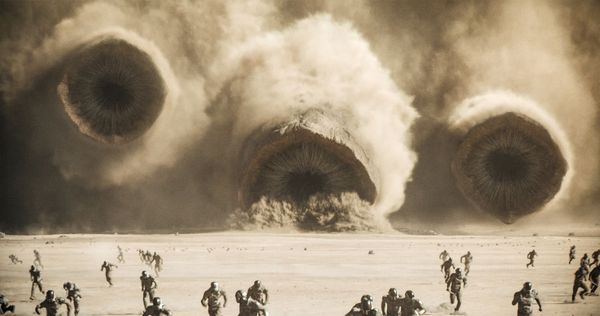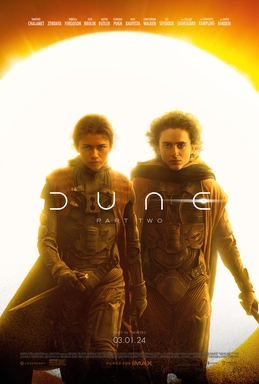Eye For Film >> Movies >> Dune: Part Two (2024) Film Review
Dune: Part Two
Reviewed by: Andrew Robertson

Here I hope to discuss Dune Part Two as an adaptation of the novel. Starting perhaps at page 353 of 562 of the 2005 Hodder & Stoughton paperback version. That's a distance in, but there's a map. One that since the 1960s has pointed to Harg Pass and Old Gap as openings of the way. Be aware that I assume you know which of those are spoilers, having read the book.
Which is a prophecy of sorts itself, for this is a history that diverts from the vision. Many and various are its partings but while some are doubtless in the interests of efficiency others feel unfair or unjust. Others still remove some of the balances, force some issues less into relief than blunt and bland flatness. Start with the thematic weights, the notion of great men and great forces in history. As with Napoleon, sometimes it is that they are there to decide, but who decides who decides? Authorial intent can be harder to read than history. Both suffer from revision, depending on their audience.

Let us start with elisions. Thufir Hawat no more. Count Fenring no more. Idaho no more. Kynes no more. When you go will you send back a letter from House Corrino? That at least retains an echo, Irulan committing an Imperial diary to a metal dictaphone. An offspring of Victrola and Curta, a type-setting of exposition that is sadly more leaden than golden. Proclaiming Imperial will gets even more complex with hints of an Empress. If the Bene Gesserit have a plan it seems one that wants to conceal, to control. If they have a hand in something they want it in a box. Paul's told not to assume humanity, but the film finds new ways to test that assertion.
Other removals are structural. There's a compression of chronology. Ignore that Shaddam is meant to appear in his thirties thanks to the anagathic properties of spice if not wealth itself. The tribes are differently split, the 'fundamentalists' to the South are protected by an equatorial storm and not bribery. The Guild scarcely features, the Houses are brought to orbit by other machinations though it's still Heighliner lights in the sky. The Bene Gesserit are brought front and centre and their conflict is stated aloud. "The prophecy is how they enslave you" cries Chani (Zendaya), though she does not yet give water to the dead. The Lady Jessica (Rebecca Ferguson) lacks the water discipline or prana-bindu control to stop either mourning or morning sickness, and that weakness feels an affront. So too to have her ride not just on palanquin but on currently active members of the Missionaria Protectiva, spreading her son's legend without her consent.
That said, Paul (Timothée Chalamet) is the only active one of the children of Dune. Presumably this Saint Alia will be differently of the knife, within her Reverend Mother she has a womb with a view but neither she nor Leto can act upon the outside world. Stilgar (Javier Bardem) is given more faith than in the text, "as it is written" feels different when the traditions are ostensibly verbal, sculptural. His conflict with Chani as a representative of the progressives feels if anything regressive, reductionist. A hook in the flesh to force the turn, to good end perhaps but no less irritating. The disputes among the Fremen are reframed as north versus south rather than city versus sietch. The banners of the battalions are not green but muted. A later armband seems less symbolic than convenience.
Paul's struggle is against a different prophecy. "Millions...starving to death" is, one supposes, a consequence, but of what? There is an ever present worry of the Saviour wither he be white (TE, Lawrence Of Arabia), white-blooded (David 8, Prometheus), blue (Jake Sully, Avatar), or blue-blooded (Balian of Ibelin, Kingdom Of Heaven). A wandering in the desert beset by djinn doesn't exactly chart a new course. That despite more clarity in the direction. The scheming between the Harkonnen and the Emperor might be more explicitly discussed between the Baron Vladimir (Stellan Skarsgard) and Shaddam IV (Christopher Walken) but the schemes of the Bene Gesserit under Gaius Helen Mohiam (Charlotte Rampling) are more naked than any of their servants. Some mysteries come right out into the open, and a term of address is treated as fact immediately, rather than courtesy. "I've killed family members before," which is true, but not with blades unpoisoned. Not with wheels within wheels replaced with training wheels, balance for beginners.
Which this is not. There was a Part One, and threads there are not picked up here. The Lisan-al-Gaib bears the mantle of the Kynes, but that family tree is stunted. Paul's takings from Jamis are left at water, no rings, no kerchief, no solemn-eyed guards and no wife. It is a point of ineffable weirdness that the last line of Dune is "history will call us wives," but it's not one unearned nor one that is without impact. This Dune does not end the same way. Indeed, this Dune gives us that word as a name in a way that the book does not. Paul Muad'dib too, in fact, becoming another thing forced upon him rather than chosen. It's that dividing line that undermines much of what Dune can and has done. There is a difference to being a witness to history and being a hero, and despite all their training it seems again and again that our protagonists are robbed of agency. Worse still, of resolution. I said after the first part that I'd reserve judgement, but here it is. While it's pretty, and often startlingly so, I was and am disappointed. I thought some of the changes made brave, even bravura, but others feel like capitulation.
If you were not convinced by Part One then Part Two will not save it. Indeed I am left underwhelmed by this as both a film and an adaptation. That despite moments that impress in ways the book cannot, sound(track) and fury. The novel makes much of economics. Ignore for a moment those of movie-making, of the presentation of grandfather worms and grandfather storms and grandfather (actual). Dune talks about shareholders, shipping rates, bribes. Hydraulic despotism, of opportunity and those not-taken. At almost three hours after the first two and a half watching, it may represent a sunk cost fallacy.
Reviewed on: 21 Feb 2024



















